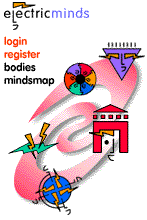
|

|
 Being Here Being Here
I am thrilled to announce that beginning this month, Being Here has a new contributor, Daryl-Lynn Johnson, host of the Being Here conference and wise woman of cyberspace mores and manners. Welcome, Daryl!
-Jill Davidson
In a moment, you will be reading my first Being Here column, so I should let you know about my intentions for this space. Me, I like to talk. Electric Minds has indulged me and given me a forum for doing so. These societies that we're forming, both here and elsewhere on the Internet, are rife with bizarre behaviors, conspiracies and alliances: we are a sociologist's dream come true. As a drop-out sociology major, I'm a big fan of navel-gazing and tossing out far-flung theories.
If you think pearls of wisdom have dropped from my lips or if you think that I'm a crazy dead-wrong crackpot, then please head on over to the Being Here Conference, check out our topic on Assumed Intimacy and state your opinion. If you have any ideas for topics for this column, I'd love to hear about them, so please email me.
So you're sitting at a bar and the person next to you starts telling you about his divorce. What do you do? Give him a hug? Some advice? Or slink away, wondering why the hell someone would unload his soul on you, a complete stranger? It might be odder still if he hopped up on his barstool and announced his wife's infidelity to the all of the bar's patrons. But these phenomena are de rigeur in the online environment. Secrets are shared and friendships formed at an accelerated pace. What is it about electronic communications that make us reveal personal secrets and form instantaneous, seemingly soul-mate friendships? One factor of this hyperpersonal effect is the glamorized presentation of personae. You can be anyone you want to be online - what comes out of written communication can be pure undistilled ego. You can be sassy and no-holds-barred, a real firecracker. You can be a nurturing there-there-er or the fastest mudslinger west of the Mississippi. You can inflate any aspect of your personality and project it online, and more importantly, you can censor any part of yourself that would normally seep through the cracks. The great paradox of online communications is that as it's easier tell the truth, it's also easier to tell a lie. Anonymity creates intimacy, false or not. How easy is it to call someone you've just met an asshole to her face? Not easy. But this sort of thing happens online every day; the assumed intimacy of written words often manifests itself in flames. You're not attacking a person, it seems, just words on a screen. The feeling that you're dumping your words down into a bottomless pit breaks down normal societal restraints. This medium is freeing; the super-ego goes on vacation. The flip side of this coin are the intensely intimate friendships that are formed online. Electronic bosom-buddies virtually prick their fingers to become blood sisters and newly formed couples profess their undying love for each other.
All is beautiful and romantic... It's very easy to be charming and caring if you know to use the edit buffer, a luxury not afforded to us in real life. In some women-only groups that I belong to, there is a code of confidentiality. Once you sign on, the expectation is that the chick code will come first. This may lead to people talking trash about people not in the group - maybe an ex-lover or a boss. Occasionally this information is "leaked" to the third party. The illusion of safety is shattered as the sacredness of the space is proven to be false: real life relationships supersede apparent online friendships and online confidences spill out. The idealization of community can lead to unrealistic expectations. What happens to groups that meet online and take their dynamic to the flesh? If the virtual world is used as a tool to enhance the face-to-face interactions, the resulting layering of realities creates a highly intimate social structure. Unfortunately there is often disillusionment when the real world infringes on our perceptions of each other and we aren't the glossy images that we present for public consumption. There are friends, lovers and enemies to be made in cyberspace - take the time to learn about people before you place them in any of those categories. Just because this technology allows us to move at an accelerated pace doesn't mean that we need to, or that we should. |
jfxo said: Being relatively new to any online community, I must admit that there is a tendency for relationships to develop at a greatly accelerated pace in the online world. I think this phenomenon has a lot to do with the one-dimensionality of using text to express one's emotions, and the limited number of inferences one can make from pure text (as opposed to, say, a face-to-face encounter) statements. So one has to be very careful when making acquaintances online, because the usual body- and voice-language inflections are not available to help one ascertain meaning in what is said. Most Active Topics: Topic 9 That is so rude! Topic 21 Advice to your favorite oldie Topic 26 Identity Hacking | |||
The feeling that you're dumping your words down into a bottomless pit breaks down normal societal restraints. This medium is freeing; the super-ego goes on vacation. | ||||
Also in Being Here: Community Networking Diversity Online Netiquette | ||||
|
|
|
electric minds |
virtual community center |
world wide jam |
edge tech |
tomorrow |
conversations
Any questions? We have answers.
©1996, 1997 electric minds, all rights reserved worldwide.
|
